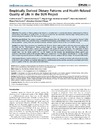Please use this identifier to cite or link to this item:
https://accedacris.ulpgc.es/jspui/handle/10553/21148
| Title: | Empirically derived dietary patterns and health-related quality of life in the SUN Project | Authors: | Ruano-Rodríguez, Cristina Henríquez Sánchez, Patricia Martínez-González, Miguel Ángel Bes-Rastrollo, Maira Ruiz-Canela, Miguel Sánchez-Villegas, Almudena |
UNESCO Clasification: | 3206 Ciencias de la nutrición | Keywords: | Quality of life Dietary patterns |
Issue Date: | 2013 | Journal: | PLoS ONE | Abstract: | Objective: The analysis of dietary patterns has become a valuable tool to examine diet-disease relationships but little is known about their effects on quality of life. Our aim was to ascertain the association between major dietary patterns and mental and physical quality of life after 4 years of follow-up.Materials and Methods: This analysis included 11,128 participants from the "Seguimiento Universidad de Navarra'' (SUN) cohort. Dietary habits were assessed using a validated food-frequency questionnaire. Factor analysis was used to derive dietary patterns. Quality of life was measured with the validated Spanish version of the SF-36 Health Survey.Results: Two major dietary patterns were identified, the 'Western' dietary pattern (rich in red meats, processed pastries and fast-food) and the "Mediterranean'' dietary pattern (high in fruits, vegetables and olive oil). After controlling for confounders, the Western dietary pattern was associated with quality of life in all domains. The magnitude of these differences between the subjects in the highest (quintile 5) and the lowest quintile of adherence to the Western pattern ranged from 20.8 (for mental health) to 23.5 (for vitality). On the contrary, the Mediterranean dietary pattern was associated with better quality of life domains: differences ranged from + 1.3 (for physical functioning) to + 3.4 (for vitality) when comparing extreme quintiles of adherence. Additional sensitivity analyses did not change the reported differences.Conclusions: Whereas baseline adherence to a Western dietary pattern was inversely associated with self-perceived quality of life after 4 years of follow-up, baseline adherence to a Mediterranean dietary pattern was directly associated with better scores in quality of life four years later in the SUN Project. | URI: | https://accedacris.ulpgc.es/handle/10553/21148 | ISSN: | 1932-6203 | DOI: | 10.1371/journal.pone.0061490 | Source: | PLoS ONE [ISSN 1932-6203], v. 8 (5) : e61490 | Rights: | by-nc-nd |
| Appears in Collections: | Artículos |
SCOPUSTM
Citations
44
checked on Jun 8, 2025
WEB OF SCIENCETM
Citations
42
checked on Feb 15, 2026
Page view(s)
113
checked on Jan 23, 2024
Download(s)
115
checked on Jan 23, 2024
Google ScholarTM
Check
Altmetric
Share
Export metadata
Items in accedaCRIS are protected by copyright, with all rights reserved, unless otherwise indicated.
